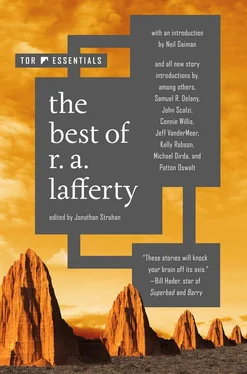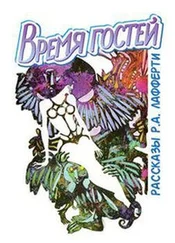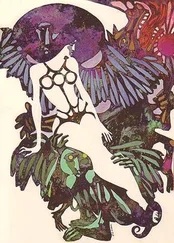It may be that the red-mud river was full of fish. Something was splashing and jumping there. Big turtles waddled up out of the water, caked with mud even around their eyes. The shores and flats were treacherous, and sometimes an eminent would sink into the sand-mud up to the hips. But the broad-footed people of the area didn’t seem to sink in.
There was plenty of greenery (or brownery, for it had been the dusty weeks) along the shores. There were muskrats, there were even beavers, there were skunks and possums and badgers. There were wolf dens and coyote dens digged into the banks, and they had their particular smells about them. There were dog dens. There were coon trees. There were even bear dens or caves. But no, that was not a bear smell either. What smell was it?
“What lives in these clay caves?” Velikof asked a woman who was digging river clams there.
“The Giants live in them,” she said. Well, they were tall enough to be Giants’ caves. A nine-footer need hardly stoop to enter one.
“We have missed it,” Arpad said. “There is nothing at all to be found here. I will travel farther, and I may find it in other places.”
“Oh, I believe we are right in the middle of it,” Velikof gave the opinion.
“It is all around us, Arpad, everything you wanted,” Willy McGilly insisted.
But Arpad Arkabaranan would have none of the muddy water, none of the red sand or the red sand caves, nothing of anything here. The interest had all gone out of him. The three of them went back to the Cimarron Hotel without, apparently, finding primitive creature or missing link at all.
They entered the common room of the hotel again. Dominos were set before them. They played draw listlessly.
“You are sure that there are no odd creatures around this place?” Arpad again asked the girl Crayola Catfish.
“John Salt is an odd creature and he comes from this place,” Crayola told them. “The Licorice Man is an odd creature, I suppose. So is Ape Woodman: he used to be a big-time football player. All three of them had regular-people blood in them; I suppose that’s what made them odd. They were almost as odd as you three creatures. And the Comet playing pool there is an odd one. I don’t know what kind of blood he has in him to make him odd.”
“How long has he been around here?” Velikof asked.
“He returns every eighty-seven years. He stays here about three years, and he’s already been here two of them. Then he goes off on another circuit. He goes out past the planets and among the stars.”
“Oh? And how does he travel out there?” Velikof asked with cocked tongue and eye.
“With horse and buggy, of course.”
“Oh there, Comet,” Willy McGilly called. “Is it true that you travel out among the stars with horse and buggy?”
“Aye, that I do,” the long gray-bearded man named Comet called back, “with a horse named Pee-gosh and a buggy named Harma. It’s a flop-eared horse and a broken buggy, but they take me there.”
“Touch clay,” said Crayola Catfish, “for the lightning.”
They touched clay. Everything was of baked clay anyhow, even the dominos. And there had been lightning, fantastic lightning dashing itself through every crack and cranny of the flimsy hotel. It was a lightning brighter than all the catfish-oil lamps in the world put together. And it continued. There was clattering sequence thunder, and there was a roaring booming sound that came from a few miles west of the thunder.
The Giants came in and stood around the edges of the room. They were all very much alike, like brothers. They were tall and somber, shabby, black-bearded to the eyes, and with black hats on their heads. Unkempt. All were about nine feet tall.
“Shall I sound like a simpleton if I ask if they are really giants?” Velikof questioned.
“As your eyes tell you, they are the Giants,” Crayola said. “They stay here in the out-of-the-way places even more than the rest of us. Sometimes regular people see them and do not understand that they are regular people too. For that there is scandal. It was the scent of such a scandal, I believe, that brought the three of you here. But they are not apes or bears or monsters. They are people too.”
“They are of your own same kindred?” Velikof asked.
“Oh yes. They are the uncles, the old bachelors. That’s why they grow tall and silent. That’s why they stand around the edges of the room. And that is why they dig themselves caves into the banks and bluffs instead of living in huts. The roofs of huts are too low for them.”
“It would be possible to build taller huts,” Willy McGilly suggested.
“It would be possible for you, yes,” Crayola said. “It would not be possible for them. They are set in their ways. They develop a stoop and a gait because they feel themselves so tall. They let their hair grow and overflow, all over their faces and around their eyes, and all over their bodies also. They are the steers of the species. Having no children or furniture, what can they do but grow tall and ungainly like that? This happens also to the steers of cattle and bears and apes, that they grow tall and gangling. They become bashful, you see, so sometimes it is mistakenly believed that they are fierce.”
The roaring and booming from west of the thunder was becoming louder and nearer. The river was coming dangerously alive. All of the people in the room knew that it was now dark outside, and it was not yet time to be night.
The Comet gave his pool cue to one of the bashful giants and came and sat with the eminents.
“You are Magi?” he asked.
“I am a magus, yes,” Willy McGilly said. “We are called eminent scientists nowadays. Velikof here also remains a magus, but Arpad has lost it all this day.”
“You are not the same three I first believed,” the old Comet said. “Those three passed me several of my cycles back. They had had word of an Event, and they had come from a great distance as soon as they heard it. But it took them near two thousand years to make the trip and they were worried that myth had them as already arriving long ago. They were worried that false Magi had anticipated them and set up a preventing myth. And I believe that is what did happen.”
“And your own myths, old fellow, have they preceded you, or have you really been here before?” Willy McGilly asked. “I see that you have a twisty tongue that turns out some really winding myths.”
“Thank you, for that is ever my intent. Myths are not merely things that were made in times past: myths are among the things that maintain the present in being. I wish most strongly that the present should be maintained: I often live in it.”
“Tell us, old man, why Boomer Flats is a place that the comets come back to?” Willy said.
“Oh, it’s just one of the post stations where we change horses when we make our orbits. A lot of the comets come to the Flats: Booger, Donati, Encke, 1914c, and Halley.”
“But why to Boomer Flats on the little Cimarron River?” Willy inquired.
“Things are often more than they seem. The Cimarron isn’t really so little a river as you would imagine. Actually it is the river named Ocean that runs around all the worlds.”
“Old Comet, old man with the pieces falling off of you,” Dr. Velikof Vonk asked out of that big head of his, “can you tell us just who are the under-people that we have tracked all around the world and have probably found here no more than seventy miles from our own illustrious T-Town?”
“A phyz like you have on you, and you have to ask!” the old Comet twinkled at Velikof (a man who twinkled like that had indeed been among the stars; he had their dust on him). “You’re one of them, you know.”
“I’ve suspected that for a long time,” Velikof admitted. “But who are they? And who am I?”
Читать дальше




![Рафаэль Лафферти - Дни, полные любви и смерти. Лучшее [сборник litres]](/books/385123/rafael-lafferti-dni-polnye-lyubvi-i-smerti-luchshe-thumb.webp)
![Рафаэль Лафферти - Лучшее [Сборник фантастических рассказов]](/books/401500/rafael-lafferti-luchshee-sbornik-fantasticheskih-ra-thumb.webp)